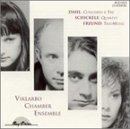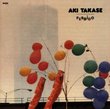| All Artists: Dahl, Vilkarbo Chamber Ensemble Title: Concerto a Tre Members Wishing: 0 Total Copies: 0 Label: Bay Cities Release Date: 9/11/1993 Genre: Classical Styles: Chamber Music, Forms & Genres, Concertos, Instruments, Reeds & Winds Number of Discs: 1 SwapaCD Credits: 1 UPC: 094659102321 |
Search - Dahl, Vilkarbo Chamber Ensemble :: Concerto a Tre
CD DetailsSimilar CDs
|
CD ReviewsA stylistic diversity which may appeal to all tastes - Don F Discophage | France | 02/20/2008 (4 out of 5 stars) "I came to buy this disc, first because I have been exploring the Bay Cities catalog, a short-lived label (1989-1993) specialized, other than the soundtracks from Hollywood films, in reissues of symphonic music by more or less obscure American neo-Romantics such as Randall Thompson, Virgil Thomson, Howard Hanson or Robert Ward (much of it is now on Citadel). Truth is, I am not very interested in that kind of music - if it were tea, it wouldn't just be a matter of cup: I'd definitely be coffee - but some of those reissues I have found quite valuable, notably those devoted to Roy Harris (Roy Harris: Concerto for Piano & Strings, Elegy & Dance, Cimarron, Toccata Chorale & Fantasy for Organ Brass & Timpani (Bay Cities)) or the one pairing George Antheil and Morton Gould (George Antheil ~ Symphony 4 / Morton Gould ~ Spirituals for Orchestra). But once in a while Bay Cities also strayed from its policy of reissues and produced new recordings, mostly of chamber music, some devoted to the "serious" music of Hollywood composers such as Korngold, Rosza or Bernard Hermann. Among these original productions, the present CD, released in 1990, attracted my curiosity as it featured compositions of Peter Schickele and Don Freund, alongside with the one of Ingolf Dahl. The Viklarbo Chamber Ensemble is an LA-based group consisting of piano, violin, cello and clarinet. The ensemble is still in existence today (can it be seventeen years later!), with another clarinet player apparently.
Ingolf Dahl's Concerto a tre from 1946 for Clarinet, Violin and Cello is based on a thematic idea consisting of six-notes, which are then subjected to a series of transformation, but Dahl insists that these formal process are not to be perceived by the listener. And he is right: whatever the formal intricaties, what you perceive is (fear not) entirely tonal, light-weight, genial, fluffy, sentimental, at times even very subtle and delicate (slow section starting 5:47) music couched in a praire-style of a sub-Copland nature (the populist Copland of the "Western" ballets or the Violin and Piano Sonata). Stravinsky can also come to mind: alternately The Soldier's Tale and The Rake's Progress. No doubt many listeners will be entertained, but in my case I am much more entertained by the outlandishly pounding Violin and Piano Sonatas of George Antheil from the early 1920s (sse my review of George Antheil: Violin Sonatas 1, 2 & 4). This one-movement piece gets only one cue point, which makes it inconvenient to access its various inside sections. Peter Schickele is of course most famous for his outlandish impersonation of PDQ Bach, the last and least of the sons of JS Bach, but I've been curious to hear HIS "serious" work. I've recently reviewed a Louisville recording of his Pentangle which I found pleasurable - an inflation to classical orchestra size and performing techniques of pop songs (Music by Norman Dello Joio, Peter Schickele & Vincent Persichetti). The present composition, a quartet for Violin, Clarinet, Cello & Piano from 1982 is very much in the same spirit of popular ballads arranged for a typically classical instrumental combination. It is not very substantial, but I find it more pleasurable than Dahl's piece - just as I enjoy very much the Beatles or Crosby-Stills-Nash & Young. In the more wistful moments it can also conjure memories of Copland's prairie-style. The one that is daring, advanced and highly inventive is Don Freund's 1980 Triomusic (Piano, Violin and Clarinet). I had encountered the music of Don Freund on earlier CDs (his Backyard Songs on Jubal Songs - Donald Freund: Backyard Songs / George Crumb: Federico's Little Songs for Children / Harvey Sollberger: Life Study / Tania Leon: Journey / Eric Stokes: Song Circle - The Jubal Trio, his orchestral showpiece "Radical Light" on New Music From Bowling Green), and found it enjoyable and promising, if not ground-breaking. Triomusic doesn't start very promisingly, with a wistful and tritely romantic tune played by solo piano which is very much in the mood of Schickele's Ballad inspiration. But it is interrupted by an aggessive violin (screechy double stops and upward glissandos), soon joined by the two other instruments much in the same mood. There are softer passages of medieval flavor (the composer calls it a `quasi-14th century chorale) which has the atmospheric subtlety of the slow movemnet of Bartok's Constrasts (it is the same instrumental combination), and more percussive ones. The second movement starts in a violently percussive way, nearing cacophony. It is interrupted at 2:40 by a striking gesture - spaced out, violently pounded piano chords with what I think are silently depressed keys made to resonate under the impact of the struck chords, accompanied by whifs of clarinet. It is followed by a passage of violent, desparate trills played by all three instruments, followed by scurrying whispers. It reminds me of the music of the Soviet maverick and Shostakovitch pupil and protégé Galina Ustvolskaya (which was totally unknown when Freund composed his triomusic). Triomusic ends in a dynamic coda with sounding like demented jazz. The variety of styles is somewhat enigmatic, but it is an inventive and attention-catching piece. All in all, this is an enjoyable recital, because of its very stylistic diversity. Presumably many will, as myself, not equally enjoy all three pieces, but at least one of them is likely to appeal. TT is 56:45. The Bay Cities disc has been reissued in 1995 on another obscure label, completed with Miklos Rozsa's Introduction & Allegro for Solo Viola, but it is presently unavailable. " |



